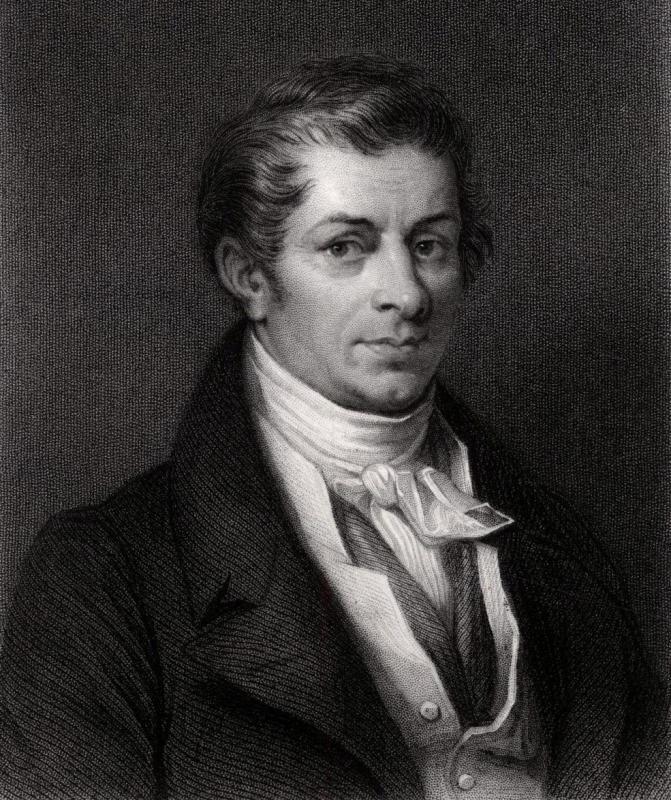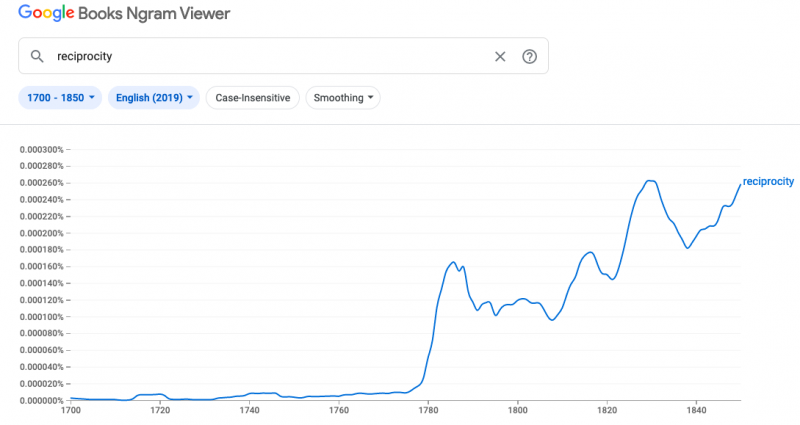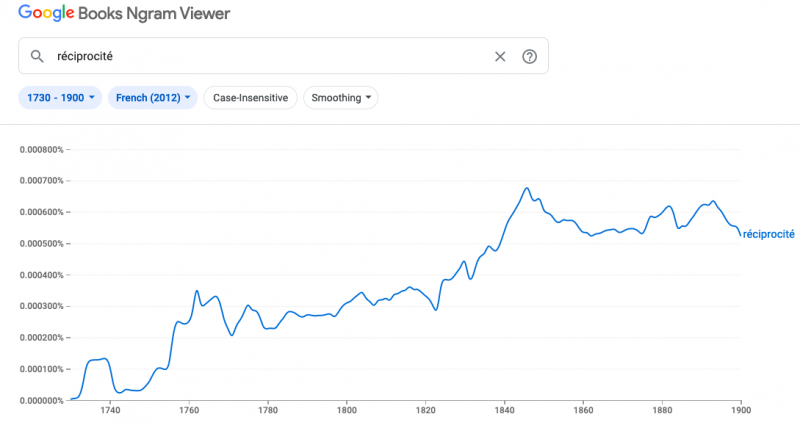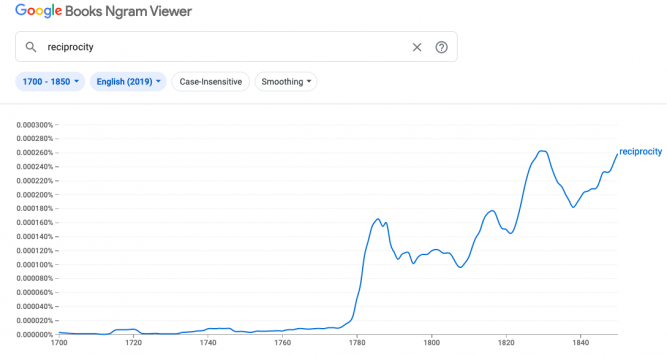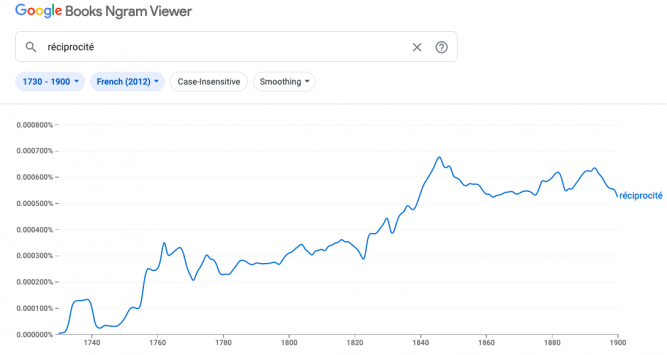Abstract
This entry traces the uses and meaning of the term ‘reciprocity’ in the French Enlightenment. After showing how the term exploded in texts about society and political economy after 1750, it shows, first, that its meanings wavered between ‘generosity’ and ‘balanced exchange’; second, that it presupposed a moral equality between the parties involved in exchanges, thereby challenging social hierarchies based on privilege and birth; third, that it was used above all to justify free trade and societies based on commercial relations; fourth, that after the French Revolution, the term was abandoned by the advocates of free-market capitalism and became the watchword of socialists and critics of free trade in the nineteenth century.
It is easy to assume that the notion of ‘reciprocity’ is universal – that all societies have a term for the moral exchanges that are thought to constitute social bonds. This assumption has guided sociologists and anthropologists, who have used the concept over the past century to describe the economic sociability of societies around the world. Historically, however, the term ‘reciprocity’, or ‘réciprocité’ in French, only came into circulation in the mid-eighteenth century, precociously in France, followed by Britain two decades later. Its use in the eighteenth and nineteenth centuries reveals much about how social bonds were being reimagined in the modern era. It also illuminates the different political economies that the term was invoked to support at different times.
This entry, which is based on an analysis of nearly two hundred French publications in which the term appears, makes three points.1 First, it shows how the concept’s sudden explosion in French texts in the mid-eighteenth century weakened social hierarchies based on rank and privilege by normalising a horizontal understanding of social relations, one in which individuals were conceived of as moral equals. Second, it shows how the term combined a ‘gift-giving’ discourse stressing generosity, obligation and solidarity, with a commercial discourse stressing balance, utility and mutual benefits. To exercise reciprocity was to be both generous and fair, but never predatory or exploitative. Third, this entry shows how invocations of ‘reciprocity’ went from justifying commercial freedom in the eighteenth century to opposing it in the nineteenth century. The French Revolution marked the turning point: once its early ‘free-market’ policies failed to create the equality and solidarity envisaged by their advocates, economic liberals distanced themselves from the term. Reciprocity gradually became the watchword of socialists and critics of free trade in the nineteenth century.2
Before 1750, réciprocité was rarely invoked. It was mostly used as a technical term in marriage contracts and international treaties. After mid-century, however, it exploded into tracts on society, commerce and politics in France. Its appearance in Britain lagged by about twenty years (see n-grams).
- 1. The online resources consulted for this study include Google Ngram Viewer, Gale’s collections ‘The Making of the Modern World’ and ‘Eighteenth Century Collections Online’, and ARTFL-Frantext. The term appears most frequently in philosophical and political-economic texts.
- 2. For an extended analysis of this evolution, see Charles Walton, ‘Capitalism’s Alter-ego: The birth of reciprocity in eighteenth-century France’, Critical Historical Studies (vol.5, n° 1, 2018), pp. 1-43.
French dictionaries did not bother defining the term until 1756.3 Twelve years later, the Dictionnaire royal, français-anglais et anglais-français tiré des meilleurs auteurs thought it prudent to flag it as ‘a dubious word or expression […] about which authors are divided’.4 A century later, by contrast, the term received a nearly 3500-word definition in Pierre Larousse’s Grand dictionnaire du XIXe siècle. Larousse underlined its growing importance. Thanks to historical progress, he believed that it would soon form the basis of all ‘social contracts’.5
- 3. Thomas Dyche’s Nouveau dictionnaire universel des arts et des sciences (Avignon: chez la vve de Fr. Girard, 1756), vol. 2, p. 310.
- 4. Abel Boyer, Dictionnaire royal, françois-anglois et anglois-françois tiré des meilleurs auteurs (Basle: chez Jean Schweighauser, 1768), vol. 1, p. 555.
- 5. Pierre Larousse, Grand dictionnaire universel du XIXe siècle: Français, historique, géographique, mythologie, bibliographique, littéraire, artistique, scientifique (Geneva: Slatkine, [orig. 1875] 1982), p. 779.
During the Enlightenment, réciprocité appeared in discussions about various kinds of sociability: polite, commercial and political. Stock formulations include ‘a reciprocity of friendship and sentiments’, ‘a reciprocity of goods and services’, and ‘a reciprocity of rights and duties’. Its sudden appearance in the mid-eighteenth century reflects the growing acceptance of a more horizontal way of conceptualising social orders.
Although Christianity had long articulated a horizontal notion of ‘universal brotherhood’ and although the nobility had long boasted ‘generosity’ as one of their central values, these discourses had always been tempered by pronounced notions of subjugation. The Enlightenment downplayed subjugation and emphasised moral equality. As Keith Baker has noted, during the Enlightenment ‘subjugation [was] replaced as a principle of order by the moral obligations men owe one another as rational creatures and members of a common human species.’6
- 6. Keith M. Baker, ‘Enlightenment and the Institution of Society: Notes for a Conceptual History’, in Willem Melching and Wyger Velema (eds.), Main Trends in Cultural History: Ten Essays (Amsterdam: Rodopi, 1994), p. 110.
A revealing indication of how the term ‘reciprocity’ helped bring about a more horizontal understanding of social relations during the Enlightenment can be found in Jean-Charles de Lavie’s abridged and modified edition of Jean Bodin’s sixteenth-century classic, Les six livres de la république. In Abrégé de la République de Bodin (1755), Lavie has Bodin saying that ‘mutual assistance is an indispensable obligation in all civil societies; as such, society forms a single moral individual. Unity can only endure through reciprocity; if [this principle] is violated, society ceases to exist.’7 Nowhere in this passage does rank or privilege enter into consideration. Individuals are taken to be morally commensurate, and what they owe each other is the same. Elsewhere in the text Lavie reduces the obligation to uphold reciprocity to the Golden Rule: ‘do unto others what you would want them to do for you.’ (Lavie 228)
- 7. Jean Bodin [Jean-Charles de Lavie], Abrégé de la République de Bodin (London: Jean Nourse, 1755), vol. 2, p. 267.
Although Lavie did not reject all forms of inequality – to the contrary, he remarked in passing on nature’s uneven distribution of ‘talents and strengths’ – he did not theorise about these differences. He foregrounded moral equality while throwing the differences into the backdrop – a conceptual move that conforms to what Pierre Rosanvallon has identified as the ‘secondarisation of differences’ in eighteenth-century thought.8 It was the scientists of the nineteenth century who would eventually ‘naturalise’ social differences of class, gender and race, foregrounding them in order to justify social hierarchies.
- 8. Pierre Rosanvallon, La société des égaux (Paris: Éditions du Seuil, 2011).
Despite the importance Lavie places on ‘reciprocity’, the term is entirely absent from Bodin’s original work. Far from theorising about moral equality, Bodin stressed communal and hierarchical considerations in reflecting on what humans owed one another. His morality of exchange was calibrated to the subtleties of rank: ‘The laws of liberality command that one consider carefully to whom one gives, how much one gives, when and where, for what ends, and the power of the one who gives.’9 Instead of invoking the idea of ‘mutual assistance’, as Lavie would in the Abrégé, the sixteenth-century Bodin called for the expulsion of vagrants, whom he referred to as ‘wasps’ and ‘vermin’ (Bodin 720-21). Lavie thus superimposed a more humane and horizontal conception of social relations onto Bodin’s treatise.
- 9. Jean Bodin, Les six livres de la République (Geneva: Estienne Gamonet, 1629), p. 747.
Notions of moral equality, generosity and the Golden Rule also appeared in a chapter titled ‘La Réciprocité’ by Rétif de la Bretonne in Les nuits de Paris (1789). ‘Unless one is crazy,’ Rétif argued, ‘one cannot reject this grand and beautiful truth: DO UNTO OTHERS AS YOU WISH THEY DO UNTO YOU.’10 Like Lavie, Rétif saw reciprocity as the core principle of social morality: ‘The entire science of morality can be reduced to behaving in such a manner that, not only will others not seek vengeance against us; they may also become fair through our example and even benevolent towards us, in consideration of our universal philanthropy.’ (Rétif de la Bretonne 31). Thus, ‘benevolence’ and balance came together in the concept ‘reciprocity’. The term spanned, and somewhat conflated, exchanges characterised by generosity and equivalence. Charity was an example of reciprocity, but so, too, was commercial exchange. Reciprocity excluded, however, exchanges characterised by antagonism and exploitation – ruthlessly taking more than giving.
- 10. Nicolas-Edme Rétif de la Bretonne, Les nuits de Paris, ou l'observateur nocturne, 8 tomes in 16 parts (London: n.p., 1789), part 3, chapter 23, p. 22 (all caps in original).
Reciprocity integrated the ‘gift-giving’ principles of charity and generosity found Christian and aristocratic ideals but secularised them. The obligation to be reciprocal was not owed to God but to society – an idea that would persist in the modern period, most notably in patriotism. What changed, however, were the kinds of political economies reciprocity was invoked to justify. In the eighteenth century, reciprocity was the watchword of economic liberals, who conflated two types of discourse that anthropologists distinguish today: ‘gift-giving’ and commerce. Eighteenth-century political economists tended to present the producing of goods and services for others as an act of generosity. In his treatise on education of 1762, François de Paule Combalusier called for teaching children ‘that all men are brothers, that they are equal by their nature, that they are essentially tied by the reciprocity of goods and services, and that the greatest among them is the most generous [bienfaisant].’11 ‘Bienfaisance’ in this context encompassed charity and productivity. Providing consumers what they needed for well-being was a virtuous act.
- 11. François de Paule Combalusier, Mémoire de l’université sur les moyens de pouvoir à l’instruction de la jeunesse et de la perfectionner (n.p., 1762), p. 6.
Similar ideas appeared in the influential L’Ordre naturel et essentiel des sociétés politiques, by Pierre-Paul Le Mercier de la Rivière. This advocate of Physiocracy (an economic theory privileging agriculture and free markets) believed that society should be grounded in the principle of ‘reciprocal utility’, that is, of ‘mutual aid’ through industriousness and exchange. Again, the distinction between charity and market exchange based on the exchange of equivalents was blurred in the idea of reciprocity: individuals had a moral duty to be generous but that generosity was manifested by being productive and respecting property rights.12 So all-encompassing was Le Mercier’s notion of ‘reciprocity’ that it extended to the political as well. Society was to be structured on the basis of reciprocal ‘rights and duties’, he insisted. It was the reciprocity between ‘rights and duties’ that ‘naturally and necessarily’ constituted the basis of civil society (Le Mercier de la Rivière 12). ‘Without duties, rights cease to exist.’ (Le Mercier de la Rivière 14) Thomas Paine would later invoke reciprocity in this sense to defend the National Assembly’s decision to omit a declaration of duties from its declaration rights of 1789. He thought it was redundant to do so since ‘a Declaration of Rights is, by reciprocity, a Declaration of Duties.’13
But it was in the domain of political economy, and especially tracts on commercial freedom, that the term ‘reciprocity’ appeared most frequently in eighteenth-century France. The concept reinforced doux commerce – the idea that commerce reduces violence by binding nations and individuals together in peaceful forms of economic sociability.14 Reciprocity conveyed a sense of balance and held out the promise of solidarity and mutual benefits. ‘All are rich through the reciprocity of needs and the reciprocal utilities of exchange,’ enthused the pioneering economic liberal François Véron Duverger de Forbonnais in 1767.15 The meanings and connotations attaching to ‘reciprocity’ foreclosed the possibility of seeing commerce as a source of inequality or antagonism.
- 14. For a seminal discussion in the scholarship on doux commerce, see Albert Hirschman, The Passions and the Interests: Political Arguments for Capitalism Before Its Triumph (Princeton: Princeton University Press, 1977).
- 15. François Véron Duverger de Forbonnais, Principes et observations œconomiques, 2 vols. (Amsterdam: Marc-Michel Rey, 1767), vol. 1, p. 9.
Use of the term ‘reciprocity’ skyrocketed in the literature surrounding the flurry of commercial negotiations during the 1770s and 1780s, when securing ‘free trade’ agreements became a quasi-obsession among Atlantic powers.16 Reciprocity and free trade held out the promise of world peace through commercial interdependence. An observer to the peace talks in Paris after the American War of Independence in 1783 summed up the general view circulating among the negotiators: ‘freedom of trade and navigation across all seas will destroy a great many pretentions that might disrupt peace in Europe, since any that do not give rise to reciprocity will no longer exist […] Balance will be established by bringing advantages to all peoples without any detriments; all will benefit.’17
But liberalized trade, it turned out, was no guarantee of mutual benefits. The Anglo-French commercial treaty of 1786, touted by its architects for its free-trade principles, dealt a crushing blow to French manufactures, which could not compete with their British counterparts, whose cheaper products flooded France. Yet, so committed were the French advocates of the agreement that all they could do in the face of the economic catastrophe was to insist that the pain would be temporary – that the reciprocity inherent in free trade would soon balance out trade deficits with Britain: ‘This [commercial] treaty will endure forever and, THANKS TO THE NATURE OF THINGS, will be greatly beneficial to both nations, since it is based on the infallible principle— a reciprocity of advantages.’18
- 16. John Shovlin, Trading with the Enemy: Britain, France, and the 18th-Century Quest for a Peaceful World Order (New Haven, CT: Yale University Press, 2021); Charles Walton, ‘The Fall from Eden: The Free-Trade Origins of the French Revolution’, in Suzanne Desan, Lynn Hunt and William Max Nelson (eds.), The French Revolution in Global Perspective (Ithaca, NY: Cornell University Press, 2013), p. 44-56.
- 17. Entry for April 12, 1783, in Correspondance secrète, politique et littéraire, ou mémoires pour servir à l’histoire des cours, des sociétés et de la littérature en France, depuis la mort de Louis XV, 18 vols. (London: Chez John Adamson, 1787–1790), vol. 14.
- 18. Charles, le marquis de Casaux, Quatrième suite des considérations sur quelques parties du méchanisme des sociétés (London: T. Spilsbury. Se trouve chez P. Elmsley, 1788), p. vii (all caps in original).
The same optimism about free markets was expressed in a decree of the National Assembly in August 1789, which liberalised the grain trade. The decree began by lecturing, ‘all French people must see themselves as true brothers, always disposed to give each other all sorts of reciprocal aid’ (work and markets).19 It ended by threatening anyone who obstructed grain markets with the high crime of lèse-nation, a kind of treason. The decree remained unpopular through to the Terror phase of the Revolution, when, in 1793, price controls on grain were imposed.
- 19. Jérôme Mavidal and Émile Laurent (eds.), Archives parlementaires de 1787 à 1860: Recueil complet des débats législatifs et politiques des Chambres françaises, 82 vols. (Paris: P. Dupont, 1867), vol. 8, pp. 510–11.
The French Revolution brought about disillusionment with commercial freedom. An awareness took hold that perhaps free markets were no guarantee of reciprocity and could even worsen inequality, rendering social bonds fractious rather than fraternal. As early as 1790, a Jacobin deputy in the National Assembly, who otherwise favoured domestic free markets, observed that international free trade did not ensure a trade balance since nations that traded freely with those that did not (most did not) would suffer. In 1796, a deputy went further by insisting, ‘while equality is essential for representative government, inequality is both the cause and consequence of commerce.’20 By the time the economic liberal Jean-Baptiste Say wrote his seminal Traité d'économie politique in 1803, the gap between ‘free trade’, which he favoured, and ‘reciprocity’, which he distanced himself from, was becoming more pronounced. Say justified free trade on grounds other than reciprocity. He commended Haiti for opening its ports to all foreigners ‘without any demand of reciprocity’.21 The term scarcely appears in any of his subsequent writings.
- 20. Antoine Français de Nantes, Coup-d’œil rapide sur les mœurs, les lois, les contributions, les secours publics, les sociétés politiques, les cultes, les théâtres, les institutions publiques, dans leurs rapports avec le gouvernement représentatif et sur tous les moyens propres à affermir la constitution de l’an III (Grenoble: P. Cadou et David aîné, Year 4 [1795–96]), p. 7.
- 21. Jean-Baptiste Say, A Treatise on Political Economy, trans. C. R. Prinsep (Philadelphia: Claxton, Remsen & Haffelfinger, 1880), p. 141.
Towards the end of the nineteenth century, free trade and reciprocity had become seen as mutually opposed principles. Titles such as ‘Hurrah for Free Trade; down with Reciprocity!’ and Free Trade versus Reciprocity summed up contemporary debates over international trade.22 The derogatory epithets ‘reciprocity-monger’ and ‘reciprocitarian’ entered into the lexicon of free-trade advocates and appeared as entries in dictionaries.23
Meanwhile, reciprocity became the watchword of socialists. Pierre-Joseph Proudhon put the concept at the heart of his theory of associationalism after the 1848 Revolution. Ironically, his views chimed with those of the political economists advocating free trade in the eighteenth century. Like them, Proudhon believed that commercial exchange strengthened solidarity, or ‘fraternité’. The main difference was that, whereas the political economists of the eighteenth century were blind to the imbalances and conflicts generated by commercial capitalism, Proudhon, like other socialists, saw them as inherent to it.24
- 22. Commercial Treaties: Free Trade and Internationalism. Four Letters (London: Macmillan, 1870), p. 25; Samuel Smith, Free Trade versus Reciprocity (Miami: Hard Press, [1881] 2014).
- 23. Arthur Crump, A Short Inquiry into the Formation of Political Opinions from the Reign of the Great Families to the Advent of Democracy (London: Longmans, Green and Co., 1885), p. 198. These epithets can be found in the Oxford English Dictionary, which dates them to the late nineteenth century.
- 24. Pierre-Joseph Proudhon, General Idea of the Revolution in the Nineteenth Century, trans. John Beverly Robinson (Mineola, NY: Dover, 2003 [orig. 1851]).
Some of Proudhon’s thinking was captured in Larousse’s entry ‘réciprocité’ in Grand dictionnaire du XIXe siècle. ‘In reciprocity,’ this social-republican lexicographer asserted, ‘profit cannot exist.’ (Larousse 779) Larousse predicted that the growing role of reciprocity in social life would soon bring an end to the inequalities and class conflicts of the capitalist order: ‘With every day [reciprocity] tends to replace antagonisms, which, until now, have been considered necessary to social organization, producing distinctions, class hierarchies, and competition among individuals.’ (Ibid.)
By the end of the nineteenth century, ‘reciprocity’ was no longer used to justified free-market capitalism. It had become, in short, capitalism’s other. Anthropologists and social scientists would soon use it to study what they took to be non-capitalistic forms of economic sociability.25 Little did they acknowledge that the concept itself was a by-product of eighteenth-century capitalism.
- 25. Anthropological studies of reciprocity owe much to the seminal work of Marcel Mauss, The Gift: Forms and Functions of Exchange in Archaic Societies, trans. W. D. Halls (London: Routledge, 1990 [orig. 1923-24]). For a more recent overview of reciprocity, see Marcel Hénaff, Le don des philosophes: Repenser la réciprocité (Paris: Éditions du Seuil, 2012).
Share
Further Reading
Force, Pierre, Self-interest Before Adam Smith: A Genealogy of Economic Science (Cambridge: Cambridge University Press, 2003).
Jones, Colin, ‘The Great Chain of Buying: Medical Advertisement, the Bourgeois Public Sphere, and the Origins of the French Revolution’, American Historical Review (vol. 101, n° 1, 1996), p. 13-40.
Rothschild, Emma, Economic sentiments: Adam Smith, Condorcet, and the Enlightenment (Cambridge, MA: Harvard University Press, 2001).
Sewell, William H., Jr., Capitalism and the Emergence of Civic Equality in Eighteenth-Century France (Chicago: Chicago University Press, 2021).
